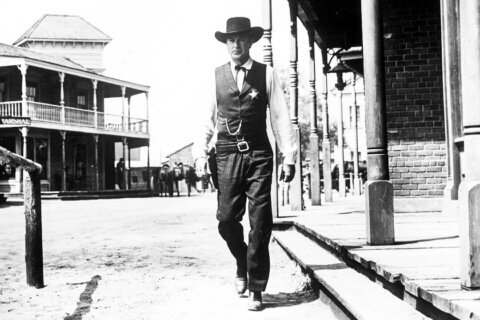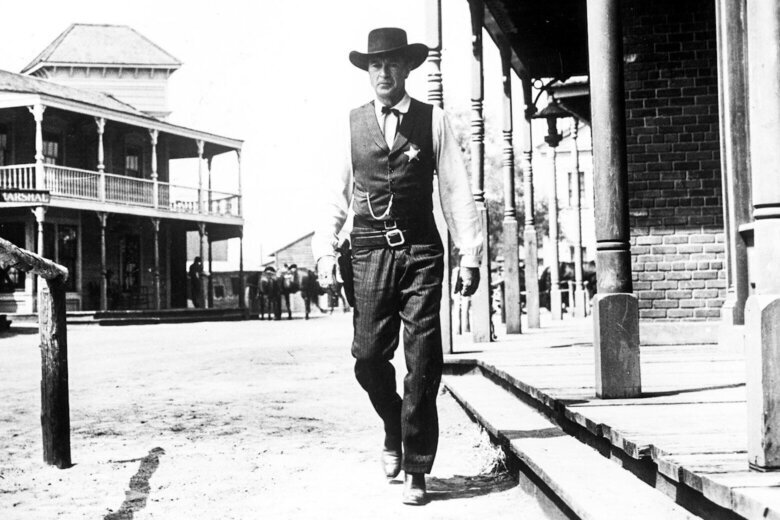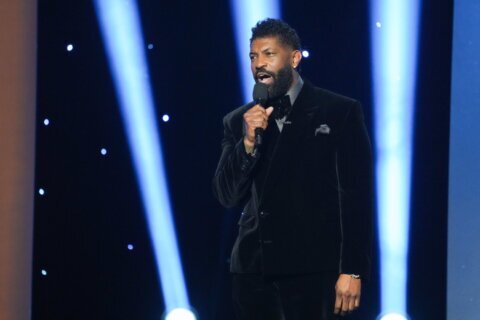The clock is ticking! You have exactly one week until a must-see event for movie buffs in D.C.

The Smithsonian National Museum of American History is hosting a special free screening of the classic western “High Noon” (1952) on Thursday, May 30 at 7:30 p.m. — a film that won Gary Cooper his second Oscar for Best Actor.
Before the screening, Cooper’s daughter, Maria Cooper Janis, will sign copies of her book “Gary Cooper Off Camera: A Daughter Remembers.” After the screening, she’ll join a Q&A with Dr. Amanda Foreman, daughter of screenwriter Carl Foreman, and Pulitzer Prize winner Glenn Frankel, author of “High Noon: The Hollywood Blacklist and The Making of an American Classic,” moderated by Ryan Lintelman of the Smithsonian.
“We’re kind of calling ourselves The Legacy Family,” Cooper Janis told WTOP. “My very close friend at the time was Pia Lindström, the daughter of Ingrid Bergman. … We were having a sleepover and I remember sitting in my room on my bed watching the television of the Oscars. … When my father’s name was announced, I got so excited that I yelled, ‘Whoopie!’ and flung my arms out and hit Pia in the face! I was afraid I knocked her teeth out. … The moment my father was getting the award I was completely distraught that I had injured my best friend.”
“The writing was wonderful, the writing was minimal,” Cooper Janis said. “The story ideas were critical in what Foreman chose to tell. His daughter Amanda, who is a wonderful major writer herself, was telling us that one of the ideas was taken from a short story of Mark Twain. There’s a town in the short story … and this town looks on the surface like a perfect little, quiet, upright, upstanding community but underneath it what crawls out from under the rock is cowardice, greed, violence, etc.”
The unflinching role of Marshal Will Kane was voted by the American Film Institute as the No. 5 greatest movie hero of all time, behind only Atticus Finch, Indiana Jones, James Bond and Rick Blaine, while the film itself was voted by the AFI as the second greatest western of all time behind only John Ford’s “The Searchers” (1956).
“He asked Duke Wayne to accept the award because my father was on location in Mexico doing a film,” Cooper Janis said. “He called Wayne and asked him to accept it for him, which was kind of ironic because … Wayne was very, very, very angry and opposed to my father doing the film because the wonderful writer Carl Foreman was having to cope with the Hollywood Blacklist. … You’ve probably seen the newsreel footage of Wayne very graciously accepting the award, then saying, ‘Well, blank, blank, blank, why didn’t my agent offer me this part?'”
The story is an allegory for taking a stand against McCarthyism, written by Foreman who was blacklisted for his progressive political views after testifying before the House Un-American Activities Committee (HUAC). While his “High Noon” script earned an Oscar nomination for Best Screenplay, Foreman fled to the UK to secretly write the Oscar-winning script for “The Bridge on the River Kwai” (1957), but he had to keep his contributions private.
“It is so relevant in the message that a major producer has bought the rights and they’re working on bringing ‘High Noon’ to Broadway because they feel that the time is right to tell the story of one man who has moral principles and integrity and stands up for what is right — even to the point of facing his own death,” Cooper Janis said.
Visually, “High Noon” was groundbreaking for its use of real-time storytelling as director Fred Zinnemann constantly cuts to the clock to build the tension with the Oscar-winning editing of Elmo Williams and Harry Gerstad. While Zinnemann went on to win the Oscar for Best Director the following year for “From Here to Eternity” (1953), film scholars widely agree that his greatest directorial work remains “High Noon.”
“I don’t know if you could amputate any one element, what made it work,” Cooper Janis said.
The film also won two Oscars for its unforgettable music, including best original score for composer Dimitri Tiomkin and best original song for Tiomkin (music) and Ned Washington (lyrics) for the iconic tune “High Noon (Do Not Forsake Me, Oh My Darlin’),” performed by singing cowboy Tex Ritter, father of actor John Ritter.
“When I married my husband, Byron Janis, the great concert pianist, the best man of our wedding was … a wonderful Russian painter named Boris Chaliapin, the son of great Russian singer [Feodor] Chaliapin,” Cooper Janis said. “Byron was explaining to Boris about ‘High Noon,’ this great music that Dimitri Tiomkin had written. … Boris said, ‘No, no, this is old Russian folk song.’ … Tiomkin was Ukrainian! It may have been totally subconscious.”
Listen to the full 40-minute conversation on the podcast below (recorded in March 2023):
Get breaking news and daily headlines delivered to your email inbox by signing up here.
© 2024 WTOP. All Rights Reserved. This website is not intended for users located within the European Economic Area.








